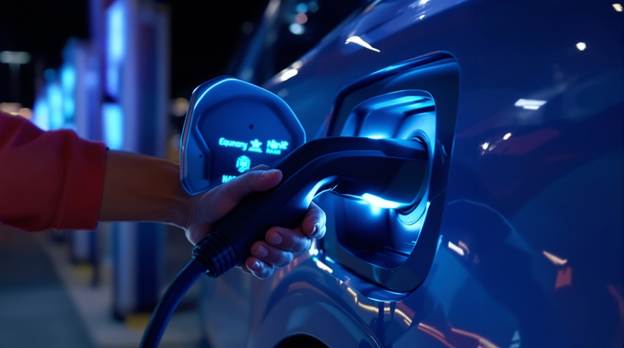For years, the narrative surrounding the electrical car market has been a David vs. Goliath story, with one dominant participant setting the tempo. However August 2025 could also be remembered because the month the Goliaths actually awakened. In a surprising show of market pressure, conventional automakers like Ford, Common Motors, Hyundai, and Kia did not simply compete within the EV area—they dominated, posting record-breaking gross sales and proving that the electrical transition has entered a fierce new section. This wasn’t only a ripple; it was a seismic shift, fueled by a potent mixture of brand name loyalty, product technique, and sensible timing, providing a compelling glimpse into the way forward for the automotive panorama.

The New Class Leaders
The August gross sales stories learn like a spotlight reel for the outdated guard. Ford noticed its Mustang Mach-E have its strongest gross sales month ever, with deliveries leaping a powerful 35%. The F-150 Lightning continued its regular climb, proving that America’s love for vans interprets seamlessly to the electrical age. Over at Common Motors, the story was much more emphatic. The corporate set a brand new all-time month-to-month file, promoting over 21,000 EVs, solidifying its quantity two place within the U.S. market. This cost was led by the quickly scaling manufacturing of its new Ultium-based automobiles, significantly the Chevrolet Equinox EV, a mannequin aimed squarely on the coronary heart of the mainstream crossover market.
In the meantime, the Korean automakers continued their spectacular run. Hyundai’s EV gross sales surged an astounding 72%, with the ever-popular Ioniq 5 seeing a 61% year-over-year improve. Its company sibling, Kia, additionally posted its best-ever month-to-month gross sales in firm historical past, pushed largely by the runaway success of the EV9. The three-row electrical SUV is carving out a vital area of interest, providing a family-friendly EV choice that few rivals can match. Collectively, these manufacturers demonstrated that they’ve cracked the code, transferring from EV contributors to phase leaders.

Decoding the Successful Method
So, why the sudden, dramatic success? It’s not one single issue, however a convergence of strategic selections. Firstly, these automakers are lastly delivering EVs within the sizes and styles that American customers overwhelmingly desire. As a substitute of quirky compliance vehicles, they’re electrifying their hottest and worthwhile segments: pickup vans (F-150 Lightning, Sierra EV), three-row SUVs (Kia EV9), and inexpensive crossovers (Mach-E, Ioniq 5, Equinox EV). They’re assembly prospects the place they’re, providing acquainted packages powered by new expertise.
Second, the ability of brand name belief and bodily infrastructure can’t be overstated. For a client making their first leap into electrification, the power to stroll into a neighborhood Ford or Chevy dealership supplies a degree of consolation and safety that newer, direct-to-consumer manufacturers cannot replicate. Lastly, there was a vital exterior catalyst: a last-minute rush from customers to capitalize on the federal EV tax credit, that are set to run out for a lot of fashions on September thirtieth. This deadline undoubtedly pulled demand ahead, turning a powerful month right into a record-shattering one.
The Shifting Market Panorama
The success of the legacy manufacturers is reshaping all the EV market. Based on analysts, EVs accounted for a file 12% of all retail car gross sales in August, a transparent signal that adoption is transferring from early adopters to the mainstream. This progress is now not solely depending on Tesla. Whereas the EV pioneer stays the market chief, its complete market share has been steadily declining as credible options flood the market. The rise of GM, Ford, and Hyundai-Kia alerts a maturation of the trade. The period of a single firm defining the EV panorama is over; we are actually in a multi-polar world the place competitors is driving innovation and giving customers extra alternative than ever earlier than.

The Street Forward
The vital query now’s whether or not this momentum could be sustained. Automakers themselves acknowledge that the top of the present tax credit score construction will possible result in a short lived cooling of demand within the closing quarter of the 12 months. The long-term trajectory, nonetheless, stays clear. The success of August proves the demand for well-designed, competitively priced EVs from trusted manufacturers is strong. The subsequent section of the race can be outlined by the power to scale battery manufacturing, safe provide chains, and, most significantly, ship a seamless and dependable public charging expertise. With practically each main automaker now dedicated to adopting the NACS (Tesla) charging normal, that essential piece of the puzzle is lastly falling into place.
Wrapping Up
August 2025 was a watershed second for the electrical car transition. It was the month the so-called “legacy” automakers proved they might construct and promote EVs at scale, not simply as area of interest merchandise, however as market-leading automobiles within the trade’s most essential segments. They’ve discovered a strong formulation, mixing many years of brand name fairness with the correct merchandise on the proper time. Whereas near-term headwinds from shifting incentive insurance policies are actual, the underlying pattern is plain. The EV race has develop into a real marathon, and the outdated guard has proven it has the stamina and technique to run on the entrance of the pack.
Disclosure: Pictures rendered by Midjourney and Gemini
Rob Enderle is a expertise analyst at Torque Information who covers automotive expertise and battery developments. You possibly can be taught extra about Rob on Wikipedia and observe his articles on Forbes, X, and LinkedIn.






